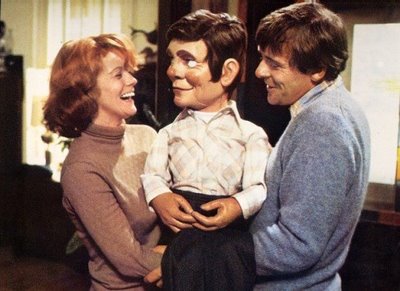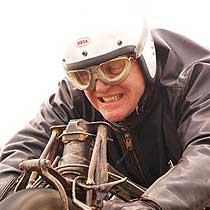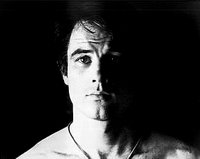
When I was a senior in college, I was certain American film culture was going to be destroyed by dilettantes who didn't really love cinema, just the sound of their ringing disapproval of "movies." I knew nothing of Cahiers du Cinema and the French effort to uplift American movies of the 1940s and '50s, from John Ford to John Garfield. All I saw--or felt, or something--was a cartoonish uplifted snoot, an overly theorized, agenda-ridden disregard for good movies. And they turned even the living body of "art," that is, foreign, films, into an embalmed corpse, coldly worshipped under glass, like Snow White or Lenin. And while all I knew of international cinema was two or three each of Felinni, Truffaut, and Kurosawa--with Grand Illusion, Beauty and the Beast, and King of Hearts off in the distance--I believed they were in danger of deadening enshrinement.
Looking back, I simply cannot pinpoint why I felt this way. I must've read something, maybe in Esquire, which could be pretty smarmy--I still rankle at the "overrated literary works" list I came across at that time: A Clockwork Orange and Slaughterhouse-Five were on it. Or someone might have said something--I had some friends who seemed to me a bit snobbish in their tastes--about Star Wars or Jaws. I honestly can't say. But in the late '70s I developed a kind of defensiveness, one for which I compensated by upholding certain movies, genres, and actors as the Truth and the Light. I can distinctly remember talking about The Fury (1978) as one should about Citizen Kane, and anyone polite enough to listen was subjected to my description of the death of some bad guys in a Tilt-a-Whirl as though it were Welles' breakfast montage. Horror films in general were my mainstay--and, given my lifelong tastes, this makes awful sense--but I also could work up a lather over actors. I remember seeing Brad Davis* in a Baretta episode (and you do not want to hear me wax rhapsodic about Robert Blake; it gives even me the creeps), and announcing he was as good as De Niro-- and then comes Midnight Express--and isn't this weird: I've just realized that both examples of American movies I've come up with in this post--and each off the top of my head--were released the year I graduated from college, 1978. It's particularly odd because of the destination for all of this:
Anthony Hopkins, whom I first noticed in the third 1978 film of the day: Magic, another genre picture I couldn't stop talking about. And it is a pretty good movie, featuring one of those post-kitten Ann-Margret performances that make my head swim--even as I write, and think of her in those baked beans in Tommy (1975), I must take the Pause That (Sort of) Refreshes. Maybe I defended a movie like Magic because it was a latter version of two animate-doll pictures of fairytale-changeling grotesquerie and shrunken-self dread I had seen in childhood: Devil Doll (1964) and Dead of Night (1945), both of which contained evil ventriloquist dummies (and both named Hugo). And I was still reeling from Karen Black's 1975 encounters with not only a Zuni fetish doll (Trilogy of Terror) but also Donald Sutherland--another actor I couldn't stop praising--as the child-stomping Homer Simpson (yikes) in The Day of the Locust. (I must watch that one again, just to resurrect those morally conflicted feelings from my first encounter with it.) So by the time I got to Magic I have both Ann-Margret and Karen Black to wrestle with--so to speak--as well as a long, dark history with the little people--perhaps, at least in movies, starting long ago and far away with Dr. Pretorius' homunculi in Bride of Frankenstein (1935). A guy I knew when I was little still remembers that I cried when Boris Karloff died; I didn't think he would ever take himself seriously when at the end of Bride he announced, "We belong dead," before pulling the switch. I can still recall the drawing I rendered of that moment, with the Monster's send-off line as voice-balloon.
 And Hopkins brought a sense of Karloffian pathos to Magic--but added a manic pressure-cooker whistle and whine to his sad monster. I was riveted, because both Corky and Fats, ventriloquist and dummy, seemed not only disturbing and frightening, but plausible, in a coked-up-for-doom kind of way. And after that like many of us I could not stop watching Hopkins, whether as Bligh or Hannibal--or, most recently for me, as Burt Munro in The World's Fastest Indian (2005); not a great picture, but I noticed how deeply committed Hopkins made me feel toward Munro. He was a man I would have liked to have grown up next door to--or to have helped out along the long way from New Zealand to Bonneville. And Burt does need help, despite his raucous individualism--Hopkins beautifully exploits those times when Burt is high and dry, allowing us to see our lesser selves in him, despite the heights of his right-stuff cool. The result is one of those characters in movies that transcends the Hollywood urge toward demographic placation, cross-indexing until there's no one left for the audience to recognize, except some well-worn tics and the trace of a smile. Burt Munro could easily fall into this trap; he seems self-consciously eager to be the carefree Casanova with an Indian-dream. Hopkins, though, won't let that happen; not only does the script give us endearingly comic moments that keep Burt human (watch the matter-of-fact way Hopkins has Burt trim his "oyster-shell" toenails with a grinding wheel, or Burt's varied reactions--from panic to bemusement--to his many confrontations with his cardio-urinary weaknesses); in a more subtle light, Hopkins' shimmering eyes keep us wondering whether Burt in the end really cares about anything except those land speed records. And even if in the end he doesn't, Hopkins never makes Burt cold or distant, but instead uses his ambition as an opportunity to see something else than glory in Burt's eyes, but a window into a slightly lost, somewhat clueless codger who still can clamp down on an idea better than most of us--and without making us feel we need to eat his dust. Hopkins takes us right with him, sharing the mad zeal--this time for speed, but ever since I can remember for whatever his best characters desire, from Ann-Margret to Dracula-on-a-stick, from 200+ MPH to a good Kee-AUNT-ee. And since 1978 or thereabouts I've been happy to let him make his run.
And Hopkins brought a sense of Karloffian pathos to Magic--but added a manic pressure-cooker whistle and whine to his sad monster. I was riveted, because both Corky and Fats, ventriloquist and dummy, seemed not only disturbing and frightening, but plausible, in a coked-up-for-doom kind of way. And after that like many of us I could not stop watching Hopkins, whether as Bligh or Hannibal--or, most recently for me, as Burt Munro in The World's Fastest Indian (2005); not a great picture, but I noticed how deeply committed Hopkins made me feel toward Munro. He was a man I would have liked to have grown up next door to--or to have helped out along the long way from New Zealand to Bonneville. And Burt does need help, despite his raucous individualism--Hopkins beautifully exploits those times when Burt is high and dry, allowing us to see our lesser selves in him, despite the heights of his right-stuff cool. The result is one of those characters in movies that transcends the Hollywood urge toward demographic placation, cross-indexing until there's no one left for the audience to recognize, except some well-worn tics and the trace of a smile. Burt Munro could easily fall into this trap; he seems self-consciously eager to be the carefree Casanova with an Indian-dream. Hopkins, though, won't let that happen; not only does the script give us endearingly comic moments that keep Burt human (watch the matter-of-fact way Hopkins has Burt trim his "oyster-shell" toenails with a grinding wheel, or Burt's varied reactions--from panic to bemusement--to his many confrontations with his cardio-urinary weaknesses); in a more subtle light, Hopkins' shimmering eyes keep us wondering whether Burt in the end really cares about anything except those land speed records. And even if in the end he doesn't, Hopkins never makes Burt cold or distant, but instead uses his ambition as an opportunity to see something else than glory in Burt's eyes, but a window into a slightly lost, somewhat clueless codger who still can clamp down on an idea better than most of us--and without making us feel we need to eat his dust. Hopkins takes us right with him, sharing the mad zeal--this time for speed, but ever since I can remember for whatever his best characters desire, from Ann-Margret to Dracula-on-a-stick, from 200+ MPH to a good Kee-AUNT-ee. And since 1978 or thereabouts I've been happy to let him make his run. *Rest him. He died of AIDS fifteen years ago (according to the IMDb, as a result of a one-time cocaine addiction), and never had the career he deserved. But all of us who loved him in Midnight Express knew his worth as an actor.
*Rest him. He died of AIDS fifteen years ago (according to the IMDb, as a result of a one-time cocaine addiction), and never had the career he deserved. But all of us who loved him in Midnight Express knew his worth as an actor.
No comments:
Post a Comment